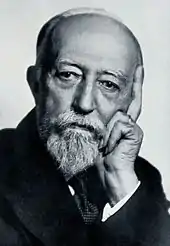Georges Henri Roger
Georges Henri Roger (4 June 1860 – 19 April 1946)[1] was a French physiologist born in Paris. He studied medicine in Paris, where he later became a professor of experimental pathology and physiology. In 1930 he was appointed dean of the medical faculty.

In the field of experimental pathology, he performed research of cholelithiasis and hepatic disease. Among his written works were articles on diseases of the liver, gastro-intestinal tract and spinal cord. In addition his 1897-98 lectures at the University of Paris were translated into English, and published as "Introduction to the Study of Medicine" (1901)
With Georges-Fernand Widal (1862-1929) and Pierre Teissier (1864-1932), he was co-author of the 22-volume Nouveau traité de médecine (New Treatise of Medicine), which was a comprehensive French masterpiece of anatomy and pathology. His name is lent to the eponymous "Roger's reflex"; a term that is sometimes used to describe excessive salivation due to irritation of the lower part of the esophagus.[2]
References
- Dictionary of medical eponyms by Barry G. Firkin, Judith A. Whitworth
- Archived 2012-02-24 at the Wayback Machine Académie Nationale de Médecine
- Mondofacto Dictionary Archived 2016-03-04 at the Wayback Machine definition of eponym
External links
- Kofoid, C. A. (1926). "Nouveau Traité de Médecine". American Journal of Public Health. 16 (4): 416–417. doi:10.2105/ajph.16.4.416. PMC 1321112.
- "Introduction to the study of medicine" by Henri Roger, M. S. Gabriel